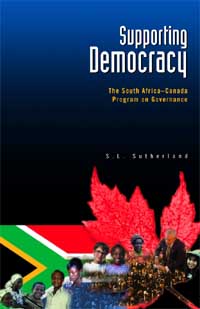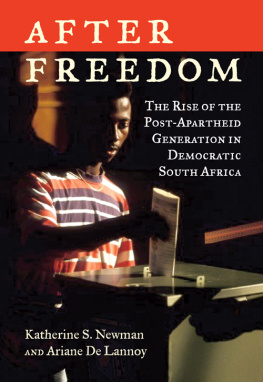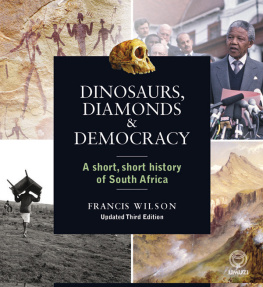Cover

| title | : | Supporting Democracy : The South Africa-Canada Program On Governance |
| author | : | Sutherland, S. L. |
| publisher | : | International Development Research Centre |
| isbn10 | asin | : | 0889368929 |
| print isbn13 | : | 9780889368927 |
| ebook isbn13 | : | 9781552500941 |
| language | : | English |
| subject | South Africa-Canada Program on Governance, Democracy--South Africa, Technical assistance, Canadian--South Africa, South Africa--Politics and government--1989-1994, South Africa--Politics and government--1994- |
| publication date | : | 1999 |
| lcc | : | JQ1981.S88 1999eb |
| ddc | : | 320.968 |
| subject | : | South Africa-Canada Program on Governance, Democracy--South Africa, Technical assistance, Canadian--South Africa, South Africa--Politics and government--1989-1994, South Africa--Politics and government--1994- |
Page i
Supporting Democracy
The South AfricaCanadaProgram on Governance
S.L. Sutherland
Page ii
Published by the International Development Research Centre
PO Box 8500, Ottawa, ON, Canada K1G 3H9
International Development Research Centre 1999
Legal deposit: 2nd quarter 1999
National Library of Canada
ISBN 0-88936-892-9
The views expressed are those of the author(s) and do not necessarily represent those of theInternational Development Research Centre. Mention of a proprietary name does not constitute endorsement of the product and is given only for information. A microfiche edition isavailable.
The catalogue of IDRC Books may be consulted online at http://www.idrc.ca/index_e.html
Page iii
Contents
Foreword | v |
Chapter 1
Introduction to the Program on Governance | |
Inception | |
Program funding | |
Chapter 2
The Preelection Period: Late 1992 to April 1994 | |
Program-design decisions | |
First funding agreement: mandate | |
Program self-evaluation | |
Chapter 3
The Period of Transitional Government: April 1994 to the End of 1996 | |
Consultation for final Constitution | |
Financial and Fiscal Commission and other financial issues | |
Public Service | |
Attrition and difficulties in planned initiatives | |
Page iv
Chapter 4
Sustaining the Progress: January 1997 Onward | |
Fiscal arrangements, planning, and budgeting | |
Intergovernmental relations | |
Legislatures | |
Service delivery | |
Central institutions and processes | |
Other activities | |
Attrition and difficulties in planned activities | |
Chapter 5
Partner and Observer Interviews | |
South African sample: availability group | |
Semidirective topic schedule | |
Interview summary | |
Appendix 1
List of Persons Interviewed | |
Appendix 2
Abbreviations and Acronyms | |
References | |
Page v
Foreword
The South AfricaCanada Program on Governance (PoG) is a special initiative of the Canadian government. Its objective is to help South Africamake the transition to democracy and establish democratic institutions ofgovernment. The PoG is funded by the Canadian International Development Agency and managed through the International DevelopmentResearch Centre (IDRC).
The PoG was initiated in 1993, following President Mandelas firstvisit to Canada, in 1992: it is a foreign-policy initiative that expresses andembodies the strong relationship between the Canadian people and SouthAfrica. This report is a brief history of the PoG. It recounts the first taskof the PoG: supporting the Democratic Movement in South Africa as itprepared to take on the responsibilities of governing the country followingits first democratic election. Since the 1994 election the PoG has workedwith the newly established provincial governments and the national government to develop the institutions of government and the capacities forgood governance.
After 5 years of operation, the PoG commissioned a review andassessment of its work. Its author, Dr S.L. Sutherland, is a well-knownpolitical scientist who has followed and published articles on program-evaluation policy as it has developed in Canadas federal government forthe past 20 years and who has worked in government in both central agencies and departments. She spent more than 6 weeks in South Africa inearly 1998, reviewing documentation and talking with South Africans andCanadians involved in the PoG.
Her report describes how the PoG has assisted South African clientsand the activities it has designed and developed. The report aims to give
Page vi
a sense of both the what and the how of a governance program, as wellas the why. It includes the assessment and recommendations derivedfrom conversations with a wide range of South African clients of the PoG.What have they found more or less useful? What changes would they recommend? Where does this program fit within the array of donor activitiesin South Africa? What is its particular niche? The report also includescomments by Canadians who have contributed substantially to this workin South Africa. What have they found useful about this endeavour?
The purpose of publishing this history and assessment of the PoG isto share with a wider audience in the development community the experience of one governance program its methodology, its approach, itssuccesses, and its failures. In terms of Canadian development policy, thePoG is an experiment in design and operation. It was originally a departure in conceptual terms, and its continued evolution provides insight intoquestions of design, operation, and management. It is also the product ofa particular synergy of needs and demands in the South African politicaland constitutional context, on the one hand, and the skills and insights ofone of Canadas foremost public servants, on the other. From its inception,the PoG has been led by Dr A.W. Johnson, who is well known for hisenormous contribution to Canadian public policy and administration,both as a practitioner and as a scholar.
IDRC has as its primary mission the creation and dissemination ofknowledge relevant to the issues of development and development assistance. Our interest is to add to the field of study by sharing the results andanalysis of the PoG as a particular initiative. Publication of this report isintended to contribute to a wider discussion on the design and delivery ofgovernance programs. What are the methods adopted by various practitioners? How do particular programs relate to the national political environment in which they operate? What unique and general challenges dogovernance programs face? How do programs solve specific design anddelivery problems. How do their activities and projects evolve as needschange? It is hoped that the detailed description of the activities of thePoG will contribute to the thoughtful analysis of these issues.
Next page








